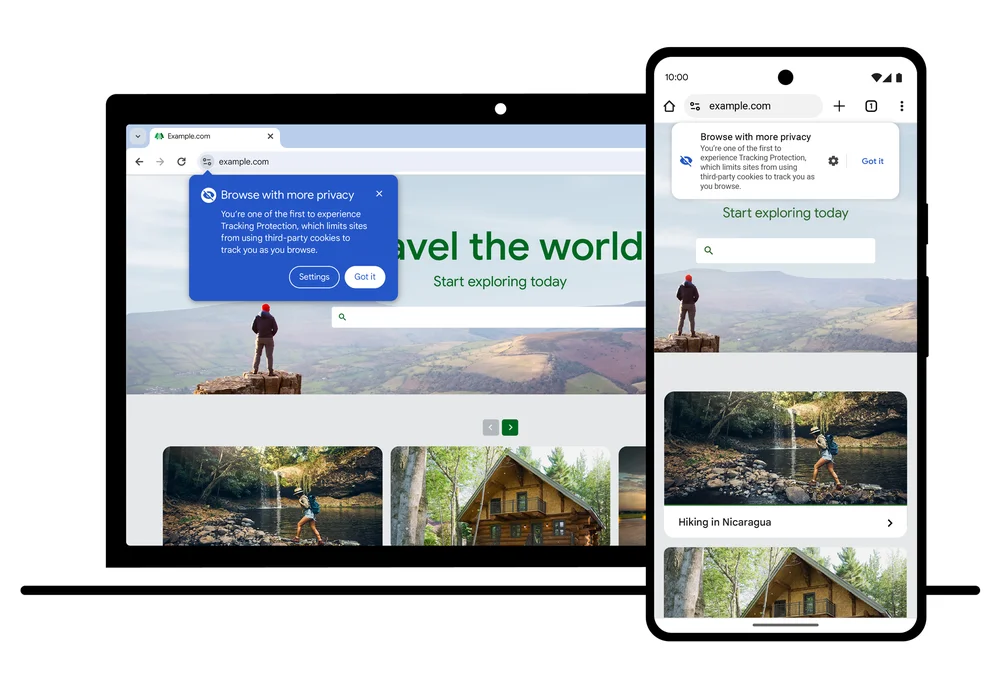With the implementation of its Tracking Protection tool, Google Chrome will restrict the data users share when visiting a website by disabling third-party cookies. While the change will initially only affect 1% of Chrome users, it will be rolled out worldwide by the end of 2024.
In short: Google has begun to phase out third-party cookies.
It’s actually late to the party on this front, as Apple’s Safari and Mozilla’s Firefox have already implamented cookie-disabling technology. However, this news is significant as Chrome is the world’s most popular browser.
Cookies – tasty tracking tools
Third-party cookies are small bits of data that is placed on a device by a website separate from the one being accessed by a user. A cookie’s job is to track a user’s behaviour, which allows brands to show them personalised ads based on browser history.
Cookies can record lots of information, such as what a user does on a website, their location in the world, what device they’re using and any subsequent web visits.
Cookies have been a crucial tool for marketers for decades, and as you can see by the amount of data they can collect, it has been an important one too. Brands across the globe have relied on them to serve personalised, data-driven adverts to customers, but now marketers need to get ready for a post cookie world. The ‘cookie crumble’, as some are terming it, is here – spurred by Google’s desire to improve privacy on the web.
A more private experience
Anthony Chavez. VP, Privacy Sandbox
“When it comes to improving privacy on the web, the work is never finished. That’s why in Chrome, we continue to invest in features that protect your data and provide more control over how it’s used. This includes taking steps to limit the ability to track your activity across different websites.”
Google also says it has phased out cookies to address competition concerns from the UK’s Competition and Markets Authority.
What is Google’s new Tracking Protection?
Google’s new Tracking Protection is available for 1% of Chrome users worldwide – and if you’re among the lucky few, you’ll be notified the next time you open Chrome on desktop or Android. You’ll then told that you’re able to ‘browse with more privacy’. A word of warning – Tracking Protection may mess with some sites, so if that happens, Chrome will issue a prompt to temporarily turn on cookies for the website.
You need more first-party data
Cookies are being shut down, and the best way to get around it is to prepare for it.
It’s been mentioned up top, but this move will have widespread repercussions across the business landscape. For a start, it levels-up the importance of first-party data and insights to help marketers target campaigns using data they’ve collected themselves.
Marketers can’t rely on other things to gain insights into user behaviour, so tools to help with audience segmentation and remarketing could be crucial. With plenty of time to work on it, there should be no excuse to be caught cold by the move.
Google has promised to help companies make the transition, although what that means in reality is hard to determine.
Anthony Chavez. VP, Privacy Sandbox
“As we work to make the web more private, we’ll provide businesses with tools to succeed online so that high quality content remains freely accessible — whether that’s news articles, videos, educational information, community sites or other forms of web content. With Tracking Protection, Privacy Sandbox and all of the features we launch in Chrome, we’ll continue to work to create a web that’s more private than ever, and universally accessible to everyone.”




RECOMMENDED FOR YOU
Meta Upgrades Advantage+ with Smarter “Andromeda” AI
Meta has kicked off 2025 with a raft of…
Meta has kicked off 2025 with a raft of…
Google Boosts YouTube Ad Options
In a digital landscape dominated by video, YouTube continues…
In a digital landscape dominated by video, YouTube continues…
Google Expands YouTube BrandConnect As Influencer Focus Grows
Influencer marketing has become a key component of digital…
Influencer marketing has become a key component of digital…